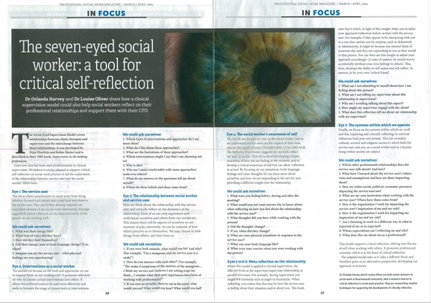This blog post considers two aspects of research – supervision and publication. The two came together in article of mine recently been published online by the Journal of Further & Higher Education (JFHE) http://dx.doi.org/10.1080/0309877X.2011.644774.
In 2008/09, I undertook the PGCert Research Degree Supervision to further develop supervision skills. For the second assignment, I made a study of colleague supervision – the supervision of staff doctoral students by their colleagues and, sometimes, managers. From it, an academic paper was developed and later submitted to JFHE. The article was an opportunity to maximise the outcomes of my study of research supervision and to create insights (possibly “new knowledge”) into a sometimes contentious and little researched area.
The starting point was a claim by Pam Denicolo (2004) that colleague supervision was “a role relationship that has been largely ignored or undervalued by [university] administration” (p. 693) and colleague students and supervisors “felt more vulnerable” than other students/supervisors (p. 706). At the time, I was Deputy Dean (Education) in the Media School and had, at BU and a previous university, observed colleague students often struggling to manage the roles of teacher, researcher, colleague and administrator. So the aim of my qualitative study amongst students and supervisors was to gain greater insight into the colleague students’ research journey and to consider how their working lives could be better structured.
Broadly, the indications from this small-scale study were:
- The students and supervisors did not feel they were “ignored”, “undervalued” or “vulnerable.” There were some advantages of easy access to supervisors that other PGRs don’t have;
- More effort is needed on the research training of colleague students. Those coming into doctoral studies from professional backgrounds said that they often learnt “on the hoof”;
- Some students, in 2009 interviews, feared for their jobs without achievement of a doctoral qualification. Others saw it as an essential part of their development of academic research and professional skills;
- Although Denicolo posited “vulnerability” as a power imbalance between supervisors and staff, the general attitude was that their supervisor was a “friendly facilitator” and supportive;
- Confidentiality of performance on doctoral studies was expected by students as part of their relationship with the colleague supervision;
- The use of group supervision by HSC to support students was seen as very beneficial in aiding cohort progress and reducing the loneliness of the doctoral student’s research journey.
This was a small-scale study (six students and five supervisors) and thus there are limitations of its generalisability, but it indicates that colleague supervision needs to be considered as a special case and not just part of the academic “day job”.

Prof Tom Watson, The Media School
Article: Watson, T., 2011. Colleague supervision – ‘ignored and undervalued’? The views of students and supervisors in a new university. Journal of Further & Higher Education. DOI: 10.1080/0309877X.2011.644774.
Reference: Denicolo, P., 2004. Doctoral supervision of colleagues: Peeling off the veneer of satisfaction and competence. Studies in Higher Education, 29 (6), 693-707.
 Congratulations to Drs. Louise Oliver and Orlanda Harvey who had their latest article published in the British Association of Social Workers magazine. The article is titled: The seven-eyed social worker: a tool for critical self-reflection”. This article is about how a supervision model, developed by Hawkins and Shohet, which focuses upon the relationship between the service user/client and the social worker. The two BU academics noted that “This model supports critical reflection, delving into the use of self when working with others. It promotes professional curiosity, which is at the heart of critical reflection”. This gives an alternative lens and approach to social work practice.
Congratulations to Drs. Louise Oliver and Orlanda Harvey who had their latest article published in the British Association of Social Workers magazine. The article is titled: The seven-eyed social worker: a tool for critical self-reflection”. This article is about how a supervision model, developed by Hawkins and Shohet, which focuses upon the relationship between the service user/client and the social worker. The two BU academics noted that “This model supports critical reflection, delving into the use of self when working with others. It promotes professional curiosity, which is at the heart of critical reflection”. This gives an alternative lens and approach to social work practice. Congratulations to Drs. Louise Oliver and Orlanda Harvey who had their latest article published in the British Association of Social Workers magazine. The article is titled: The seven-eyed social worker: a tool for critical self-reflection”. This article is about how a supervision model, developed by Hawkins and Shohet, which focuses upon the relationship between the service user/client and the social worker. The two BU academics noted that “This model supports critical reflection, delving into the use of self when working with others. It promotes professional curiosity, which is at the heart of critical reflection”. This gives an alternative lens and approach to social work practice.
Congratulations to Drs. Louise Oliver and Orlanda Harvey who had their latest article published in the British Association of Social Workers magazine. The article is titled: The seven-eyed social worker: a tool for critical self-reflection”. This article is about how a supervision model, developed by Hawkins and Shohet, which focuses upon the relationship between the service user/client and the social worker. The two BU academics noted that “This model supports critical reflection, delving into the use of self when working with others. It promotes professional curiosity, which is at the heart of critical reflection”. This gives an alternative lens and approach to social work practice.













 From Sustainable Research to Sustainable Research Lives: Reflections from the SPROUT Network Event
From Sustainable Research to Sustainable Research Lives: Reflections from the SPROUT Network Event REF Code of Practice consultation is open!
REF Code of Practice consultation is open! BU Leads AI-Driven Work Package in EU Horizon SUSHEAS Project
BU Leads AI-Driven Work Package in EU Horizon SUSHEAS Project ECR Funding Open Call: Research Culture & Community Grant – Apply now
ECR Funding Open Call: Research Culture & Community Grant – Apply now ECR Funding Open Call: Research Culture & Community Grant – Application Deadline Friday 12 December
ECR Funding Open Call: Research Culture & Community Grant – Application Deadline Friday 12 December MSCA Postdoctoral Fellowships 2025 Call
MSCA Postdoctoral Fellowships 2025 Call ERC Advanced Grant 2025 Webinar
ERC Advanced Grant 2025 Webinar Update on UKRO services
Update on UKRO services European research project exploring use of ‘virtual twins’ to better manage metabolic associated fatty liver disease
European research project exploring use of ‘virtual twins’ to better manage metabolic associated fatty liver disease